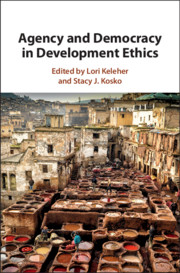Book contents
- Agency and Democracy in Development Ethics
- Agency and Democracy in Development Ethics
- Copyright page
- Dedication
- Contents
- Figures
- Tables
- Contributors
- Acknowledgments
- Introduction
- A Note from David A. Crocker
- Part I Development Ethics
- Part II Agency
- 6 Expanding Agency
- 7 “Reason to Value”
- 8 The Multidimensionality of Empowerment
- 9 Agency, Income Inequality, and Subjective Well-Being
- 10 The Legal Status of Whales and Dolphins
- Part III Democracy
- Part IV Development Ethics, Agency, and Democracy
- Index
- References
8 - The Multidimensionality of Empowerment
Conceptual and Empirical Considerations
from Part II - Agency
Published online by Cambridge University Press: 26 February 2019
- Agency and Democracy in Development Ethics
- Agency and Democracy in Development Ethics
- Copyright page
- Dedication
- Contents
- Figures
- Tables
- Contributors
- Acknowledgments
- Introduction
- A Note from David A. Crocker
- Part I Development Ethics
- Part II Agency
- 6 Expanding Agency
- 7 “Reason to Value”
- 8 The Multidimensionality of Empowerment
- 9 Agency, Income Inequality, and Subjective Well-Being
- 10 The Legal Status of Whales and Dolphins
- Part III Democracy
- Part IV Development Ethics, Agency, and Democracy
- Index
- References
- Type
- Chapter
- Information
- Agency and Democracy in Development Ethics , pp. 205 - 227Publisher: Cambridge University PressPrint publication year: 2019



